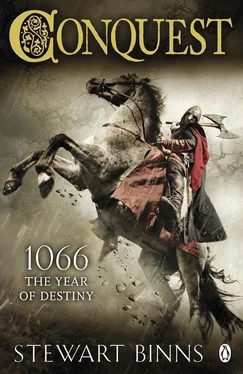John Azoukh answered for John Comnenus.‘It is we who should be humble. We are guests in your beautiful meadow. Let us eat; the chill of the night air will soon be upon us.’
An hour later, over a hundred men sat in the cooling twilight to enjoy their food and wine. Leo said grace, then sat and gazed at the scene before him. Behind John Comnenus stood his equerry and men-at-arms: three tall men in blue tunics with gilded trim, their burgundy cloaks held by heavy bronze clasps of the royal house of Comnenus. With the light from the campfires flickering across their bearded faces and intricately worked armour, they had the ostentatious trappings of court soldiers, but their rugged demeanour was of men hardened by the ferocity of battle.
Prince John Azoukh sat beside the heir to the Purple of Byzantium. Twenty-eight years old, the same age as his royal companion, his was a remarkable story. As a small child he had been taken as a slave by a general of the Imperial Army, who, charmed by the little boy’s humour and intelligence, had given him to the Emperor Alexius as a present.
Leo could see why the Arab slave had endeared himself to the family of Alexius: his soft black curls were the perfect complement to a clear olive skin, gentle dark-brown eyes and a strikingly handsome face. But his most endearing quality was his infectious vitality. The Emperor had recognized his charms but also his intelligence; he grasped numbers and languages quickly, wrote poetry and played the flute beautifully. John Azoukh, the slave, was brought up at court as if he were John Comnenus’ brother; they became inseparable.
John Comnenus also had many qualities but was more reticent and considered. He was shorter than his Moorish companion and not the most handsome of men, but wearing his crimson smock, gold wristlets, gleaming bronze breastplate and a ready smile, he had the aura of a benign leader. There was much anticipation that Prince John would continue the wise and honest rule of his father. Byzantium was an empire of many cultures and peoples. Its noble families had intermarried with the aristocracies of the many lands they had conquered, creating a mingling of ‘old blood’ and ‘new blood’. For 500 years, since the fall of the Roman Empire in the west, Byzantium had kept alive the traditions of the Graeco-Roman world, and Christian civilization.
To the right of the Prince were the Immortals. First raised by the Persians centuries before, these men from Byzantium’s eastern provinces were renowned for their loyalty and fierceness in battle. Behind them, arranged in neat rows of tripods, were their pointed mail-fringed helmets, long pikes and round shields, and tethered lines of immaculate grey horses, freshly fed and groomed.
Forty years earlier, in 1071, the Byzantine army had been in disarray after the disaster of the Battle of Manzikert. Muslim armies had besieged Byzantium to the south and east, Asian barbarians had threatened from the north and, in the west, powerful forces from northern Europe were rivals for power in Christendom. However, Alexius I had reorganized the army and reinvigorated the Immortals.
The Varangians, to the left of the Prince, were no less impressive. Not so uniform in appearance, they carried a terrifying assortment of weapons, including their redoubtable weapon of mayhem, the double-handed battle-axe. Only with years of practice and a massively powerful upper body was it possible to wield it with deadly intent; it struck fear into the hearts of all their enemies. Although these men were foreign mercenaries, they were intensely loyal to their oath of allegiance and had served the throne of Constantinople for over a hundred years. Some were Vikings from Scandinavia; many were Normans from Sicily or North Africa. There were Celts from Europe’s northern wilderness. A few were English. Legend had it that, fifty years before, a handful of housecarls from the army of King Harold of England, who had survived the final redoubt at the Battle of Senlac Ridge near Hastings, had fled to Constantinople to join the Varangian Guard rather than submit to the rule of William the Bastard, Duke of Normandy.
The Varangians’ hair and beards were longer and wilder than those of the Immortals, whose tight black curls were kept neatly trimmed. Their locks also presented a mix of colours: red, blond and black and every shade in between, including the grey tresses of many gnarled veterans. Their shields came in all shapes and sizes and were decorated with a variety of creatures like an heraldic circus: eagles, boars, rams, bears, serpents and myriad mythical beasts. The royal household never ventured far without a bodyguard of Immortals and Varangians.
Way above Leo’s clearing, in an eyrie all of his own, the wizened face of the old man creased into a contemplative smile. He was recalling his own adventures. He too had been a warrior.
‘Father, we need your help.’ John Azoukh’s voice broke through the babble of a hundred men, now seriously engaged with their food, wine and conversation. ‘We are here on the Emperor’s business. There is an old man who lives in these hills and we need to find him. We mean him no harm; he is a friend of the great Alexius, who speaks very highly of him. He says that he has the wisdom of a man who has lived three lifetimes.’
‘I know no such man anywhere.’ Leo was startled to hear the description of a man of rare distinction and feared he had been too obvious in his denial.
To the locals the man was a hermit, rarely seen, a foreigner from a northern land. Nobody knew much about him, except that his unwelcoming manner and fearsome appearance led everyone to avoid him. He walked with the bowed back of an old age bedevilled by arthritis. Nevertheless, his frame was formidable, with broad shoulders and powerful arms and hands like those of a blacksmith. He had a shock of grey-blond hair that cascaded down his back and a snow-white beard that contrasted sharply with his deeply wrinkled face, burned chestnut-brown by the Mediterranean sun.
Leo had visited his reclusive parishioner just once and had spent only an hour with him. He had learned nothing of his past, but his manner and bearing gave strong hints of a turbulent life and of a man of rare gifts. He had longed to return and learn more but had promised not to; it seemed neither honourable nor wise to break a promise to such a man.
‘Are you sure, Father?’ There was a hint of impatience in John Azoukh’s question. ‘You must understand that all the great work of the Emperor Alexius must now be consolidated by the rightful succession of his beloved son, John.’
‘But, my noble Lord, what has that got to do with an old man in the hills of Elis?’ Leo responded meekly, but with a firm resolve not to place one of his flock in danger.
‘So you do know such a man?’
‘I didn’t say that, sire. I simply don’t understand what anyone from my humble parish could offer the heir to the throne of Constantinople.’
‘Wisdom, Father Leo,’ John Comnenus interrupted in a gentle tone, sensing his friend’s irritation and Leo’s discomfort. ‘My father says I have all the qualities to follow him, except wisdom. He isn’t much longer for this life and he grows anxious. My sister, Anna, is very shrewd; she plots against me and has powerful friends and an ambitious husband. My father doubts that I have the wisdom to deal with her. He has asked me to make this journey, to find this man and hear his story. He says that when I hear the account of his life, I will understand how men find the wisdom to know what they have to do and the courage to act on their judgement. So, Father, that is why we are here.’
Читать дальше












